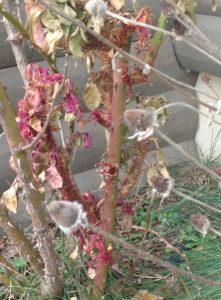By Debbie Roland
Master Gardener
Rose leaf rosette is a virus which attacks roses and causes strangely deformed stems, leaves and flowers. The disease requires a eriophyid mite to transfer the disease between plants. These mites are not visible to the eye.
Since the mites do not fly, they are transferred by wind, tools, animals or people. The mites feed on the plant and transfer the virus into the vascular system of the rose.
In 1941 the disease was reported in Wyoming, California and Manitoba. It has spread south and east since. This disease has resulted in roses being removed and destroyed in the West Texas area. A recent call from a Midland resident who had to remove some of her roses gives us a reminder to be on the lookout for rose rosette and examine your roses frequently.
Here is what you are looking for:
- New growth that is red and never turns green.
- Excessive thorniness on thick stems.
- New flowers that are stunted looking.
- Leaves that may be contorted, small and yellow.
- Flower buds that appear in tiny clusters. These are called rosettes and that is where the name comes from.

Your plant could have one or all of these symptoms. There is not a home treatment for this disease and the plant (or plants) must be removed. If you leave it there it will transmit the disease to other plants, possibly in your neighbor’s yard.
You must dig up the entire plant, including the roots. Wear disposable gloves and cover the plant with a heavy duty large trash bag to keep the mites from dropping to the ground. Dispose of the bag – do not compost or put it in a brush pile. If any roots are left in the soil they can still carry the disease.
After the rose is disposed of, sanitize your equipment (use 10% bleach water) and clothing (wash with warm soapy water) and throw away your gloves in the trash bag.
It is not recommended that you plant another rose in this area for several years. At this time there are no roses on the market that are completely resistant. However, other plants are not susceptible so you may want to replace them with an attractive flowering native plant.
For more information, call the AgriLife office at 498-4071 in Odessa or at 686-4700 in Midland or visit aggie-horticulture.tamu.edu or westtexasgardening.org.




